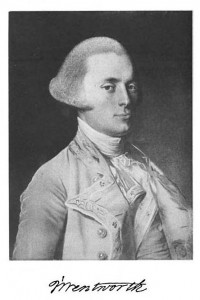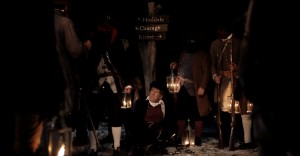Pitch Package
We’re working on what they call a “pitch package,” which showcases the series for the media and potential broadcast partners. We thought those of you interested in our project, might like to take a peek. Lots of character bios, back-stories and historical background..
SYNOPSIS
 Tavern keeper and justice of the peace Silas Rhodes (James Riley), alongside British deserter Bob Wheedle (Nathan Kershaw) lead a band of rebel underground soldiers known as “The Sons of Liberty,” in acts of midnight justice against royal officials attempting to enforce unpopular law, in the pre-revolutionary New England township, Courage, New Hampshire. Tales depicting daily life in this 18th century early American township mixed with the turmoil of pre-revolutionary war in accurate historical detail, provide a storyline filled with intrigue, politics, family-life and romance in this colonial period drama series.
Tavern keeper and justice of the peace Silas Rhodes (James Riley), alongside British deserter Bob Wheedle (Nathan Kershaw) lead a band of rebel underground soldiers known as “The Sons of Liberty,” in acts of midnight justice against royal officials attempting to enforce unpopular law, in the pre-revolutionary New England township, Courage, New Hampshire. Tales depicting daily life in this 18th century early American township mixed with the turmoil of pre-revolutionary war in accurate historical detail, provide a storyline filled with intrigue, politics, family-life and romance in this colonial period drama series.
PRODUCTION NOTES
 The township of Courage is fictional, but the major events of the era are true to life. Governor John Wentworth was a young and popular royal governor, who had lived for many years in England and who bore the name of an illustrious New Hampshire family. During the years 1767 to 1775 Wentworth attempted to make unpopular English laws at least palatable to the flinty New Englanders, using his personal charm, crown appointments, and a preference for non-confrontation where possible. During these years, Wentworth was borrowing money to build a palatial country estate in Wolfesborough, and he appears to have been suited to his simultaneous post as royal surveyor of the King’s forest, since he enjoyed country travel. A great patron of education, Wentworth helped establish Dartmouth college. He makes an excellent villain on many accounts, since he appears to have used progress, diplomacy, and discretion in a way, that — had he been successful — would have delayed English liberties from being firmly established in the colonies.
The township of Courage is fictional, but the major events of the era are true to life. Governor John Wentworth was a young and popular royal governor, who had lived for many years in England and who bore the name of an illustrious New Hampshire family. During the years 1767 to 1775 Wentworth attempted to make unpopular English laws at least palatable to the flinty New Englanders, using his personal charm, crown appointments, and a preference for non-confrontation where possible. During these years, Wentworth was borrowing money to build a palatial country estate in Wolfesborough, and he appears to have been suited to his simultaneous post as royal surveyor of the King’s forest, since he enjoyed country travel. A great patron of education, Wentworth helped establish Dartmouth college. He makes an excellent villain on many accounts, since he appears to have used progress, diplomacy, and discretion in a way, that — had he been successful — would have delayed English liberties from being firmly established in the colonies.
What we know about New England jurisprudence comes from the journals and law papers of John Adams, and the day books of New Hampshire justice of the peace Matthew Patten. Insights into country life and trade are also found in the works of Abner Sanger and Samuel Lane.
Fictional Characters
Silas Rhodes is a country justice of the peace and tavern keeper. The father of six children, his wife died in childbirth some nine years before the story begins. A great believer in the promise of exploration and industry and covenant, Silas shares the New England longing for “a city on a hill.” Disputes tire him. He would rather have a tankard of cider than sit on a court of common pleas.
Noah Pine serves as the constable of Courage township. It doesn’t pay much and no one wants the job of arresting neighbors, but Noah appears suited to it. He keeps a small farm, raises cattle, and is not above a little rough justice, when procedure fails.
 Abby Lamb, as a child, lost her entire family to a raiding party of Abenaki Indians just prior to the French and Indian war. She was taken in by her Uncle Silas and raised in the Rhodes’ family public house, where she keeps tavern. She tends to fend for herself.
Abby Lamb, as a child, lost her entire family to a raiding party of Abenaki Indians just prior to the French and Indian war. She was taken in by her Uncle Silas and raised in the Rhodes’ family public house, where she keeps tavern. She tends to fend for herself.
Abraham Foxe is a country attorney who travels the circuit court. A widower and the father of four children being raised by his sister in Portsmouth, he hopes to re-establish his family in Courage. He is one of those men the age called “sensible and steady,” not quick to join causes.
Bob Wheedle AKA “Sam Courage” grew up in the British army, earning the rank of sergeant before choosing a life in Courage. Most of the assumptions he made about life seem to be changing. Life without military discipline is simultaneously enlarging and restricting. He has the sense there is still a fight to be had.
 Sarah Pine AKA “Sarah Courage” grew up in Providence, Rhode Island, where she was surrounded by Quakers, Baptists, Jews, Congregationalists, and every New Light religious idea known to colonial man. She appears foolish to some, supremely faithful to others.
Sarah Pine AKA “Sarah Courage” grew up in Providence, Rhode Island, where she was surrounded by Quakers, Baptists, Jews, Congregationalists, and every New Light religious idea known to colonial man. She appears foolish to some, supremely faithful to others.
Tom Fogg. Like Wheedle, Fogg is a child of the British army, but Bob’s desertion left him adrift, and that, coupled with a puppy-dog crush on Abby Lamb, who he set eyes on a year before during a country scout, set him on a course for New Hampshire. He has never been taught to read,
Simeon Trapp is a member of what they called the “Wentworth Clan” of oligarchs who ran New Hampshire in the early 1770s. He regards the insurrection in Boston, and the antics of Samuel Adams, as passing political fads. His devotion to ascending within the clan can bring out his barracuda courtroom instincts in a way that annoys even his patron, Governor Wentworth.
 Silence Laud enjoys the fickle patronage of Governor Wentworth and has agreed, essentially, to spy on the citizens of Courage. He is playing both sides of the fence, having established his credentials with the sons of liberty, but attempting to confirm a secret correspondence with the governor. He chases petticoats and secretly abhors his Congregational roots. He is ambitious to be ordained into the Church of England.
Silence Laud enjoys the fickle patronage of Governor Wentworth and has agreed, essentially, to spy on the citizens of Courage. He is playing both sides of the fence, having established his credentials with the sons of liberty, but attempting to confirm a secret correspondence with the governor. He chases petticoats and secretly abhors his Congregational roots. He is ambitious to be ordained into the Church of England.
John Hildreth purchased land on the New Hampshire frontier where it is cheap, but unready to farm. He needs to spend a great deal of his time, clearing forest and preparing the land to plant. He has cultivated the affection of Sally Rhodes, the eldest daughter of Silas. He lives in a rude square cut cabin and has given shelter to Bob Wheedle.
Historical Background
The American Revolution did not begin at Lexington and Concord. Some would say it began at least a century before in the self-governing townships of New England– in their self-reliance and profound fear of royal and ecclesiastical prerogative. Unlike their high-gentry counterparts in England, a justice of the peace in New England was usually an inkeeper, commissioned by the governor to keep the peace and hear minor disputes in the local tavern. With a shortage of cash, neighbors were bound to each other by a barter system that kept them under mutual obligation over long periods of time. Each township was typically united around a common meeting house, pastor, and faith tradition, (in New Hampshire either Congregational, Presbyterian or Baptist). The New England Sabbath was so profoundly quiet that strangers could be identified by their willingness to travel on Sunday. Each spring and each fall, a day of fasting and humiliation was strictly observed so as to bless the harvest and implore God’s protection against their enemies.
 For all of that, they were not prudes or averse to celebration. Some studies have indicated one third of eldest children were conceived out of wedlock, and dozens of rum distilleries supplied the hard spirit preferences of the age. John Adams consumed two large tankards of hard cider a day. Dancing masters traversed New England teaching the latest dances to the young men and ladies, and some dances were known to have gone on under, candle-light until the wee hours of the morning, when guests would find themselves a place on the floor rather than walk miles home in the dark.
For all of that, they were not prudes or averse to celebration. Some studies have indicated one third of eldest children were conceived out of wedlock, and dozens of rum distilleries supplied the hard spirit preferences of the age. John Adams consumed two large tankards of hard cider a day. Dancing masters traversed New England teaching the latest dances to the young men and ladies, and some dances were known to have gone on under, candle-light until the wee hours of the morning, when guests would find themselves a place on the floor rather than walk miles home in the dark.
The New Hampshire and Vermont frontiers were peopled by a very sturdy band of young farmers who had to clear hundreds of acres of old growth timber just to plant, and when Burgoyne’s army arrived, the British saw, first hand, how tough the frontier had made their New England opponents.
The men of New Hampshire saw themselves, however, as Englishmen who bristled at any hint of treason, so when it became apparent their rights were under assault by what they considered evil ministers corrupting their king, they went underground. When 400 men attacked a British revenue schooner, the Gaspee, not one credible witness could be found to indict the conspirators. Even today, we don’t know the names of many who were involved in the tea party of 1773. Secrecy was required and sometimes those secrets went to the grave. Royal officials were intimidated, as were those who sympathized with them. We like to think of the American Revolution as a triumph of faith and reason. It certainly is. But tar, feather, and the thunder of a hundred horses’ hooves at midnight added something fearful to the mix.
Courage, New Hampshire will portray the country life of the colonies — above and below the surface.




